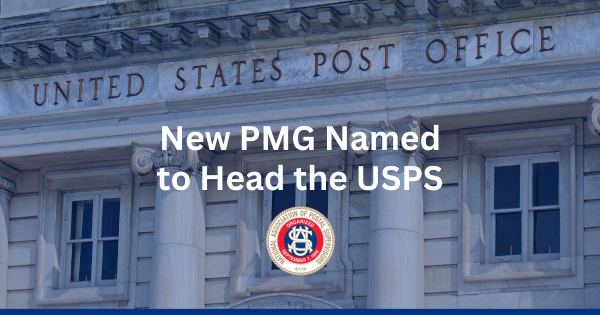New PMG Named to Head the USPS
New PMG Named to Head the USPS
By Ivan D. Butts
NAPS National President
Hello, NAPS brothers and sisters. As I write this column, the white smoke has appeared. Well, not that white smoke, but the USPS Board of Governors has officially announced that David Steiner will lead the Postal Service as the next postmaster general. The announcement comes as employees of America’s Postal Service face the same attacks all federal agency employees are confronting under the current administration.
Amber McReynolds, BOG chair, announced the board’s appointment at its May 9 open session meeting. She said PMG Steiner is set to start in July.
Having a former FedEx executive on the BOG and as PMG raises several significant implications, both positive and controversial. The most notable example is Louis DeJoy, appointed as PMG in 2020. He previously was an executive at New Breed Logistics, a contractor for FedEx and other private logistics companies.
With the appointment of Steiner comes some private vs. public interests. FedEx is a for-profit competitor of America’s Postal Service in package delivery. The company operates under different motives than the USPS, which has a public service mandate. A former FedEx exec could favor policies that benefit private-sector models, potentially undermining the USPS’ public service mandate.
In past columns, I have mentioned how those who could/would love to see the privatization of America’s Postal Service were at the doorstep of USPS Headquarters. With Steiner’s appointment, this group may have moved to the 10th floor. Critics argue that such a background may accelerate efforts to privatize the agency, either overtly or through cost-cutting that erodes service quality and public trust.
On a positive note, we could see some logistical efficiency gains. FedEx is a global leader in logistics. An executive from that world could bring further modernization, efficiencies and cost-saving practices the USPS has struggled to implement due to legacy systems and political constraints. A background in high-level logistics could help the USPS better handle volume surges (such as during elections or holidays) and improve delivery times.
Additionally, the USPS has one of the largest unionized federal workforces. A PMG from the private sector might bring a corporate mindset that conflicts with union protections, potentially leading to labor disputes or reductions in workforce protections.
Under DeJoy’s “Delivering for America” plan, the USPS saw reductions in overtime, removal of mail sorting machines and slowing delivery standards. These all were justified as cost-saving measures, but heavily criticized as anti-service.
Furthermore, implementation of poor staffing models in the new DFA facilities helped seal the fate of our 75th PMG. After DeJoy spent most of his term making cuts to all areas of operations, I remember the outgoing proclamation from our 73rd PMG, Pat Donahoe, who said, “The USPS cannot cut its way to solvency.”
One thing has been true over the past 15 years: Every USPS initiative has hurt and harmed the delivery of mail to our country, with rural America taking the hardest service hit each time. Appointing someone with private-sector ties also could politicize the agency, especially during election years when vote-by-mail is critical. The perception of bias or conflict can erode public trust.
We will know very shortly—after PMG designee Steiner takes the helm in July—whether he believes in serving our country as do the over 600,000 hard-working employees of America’s Postal Service.
In solidarity…
